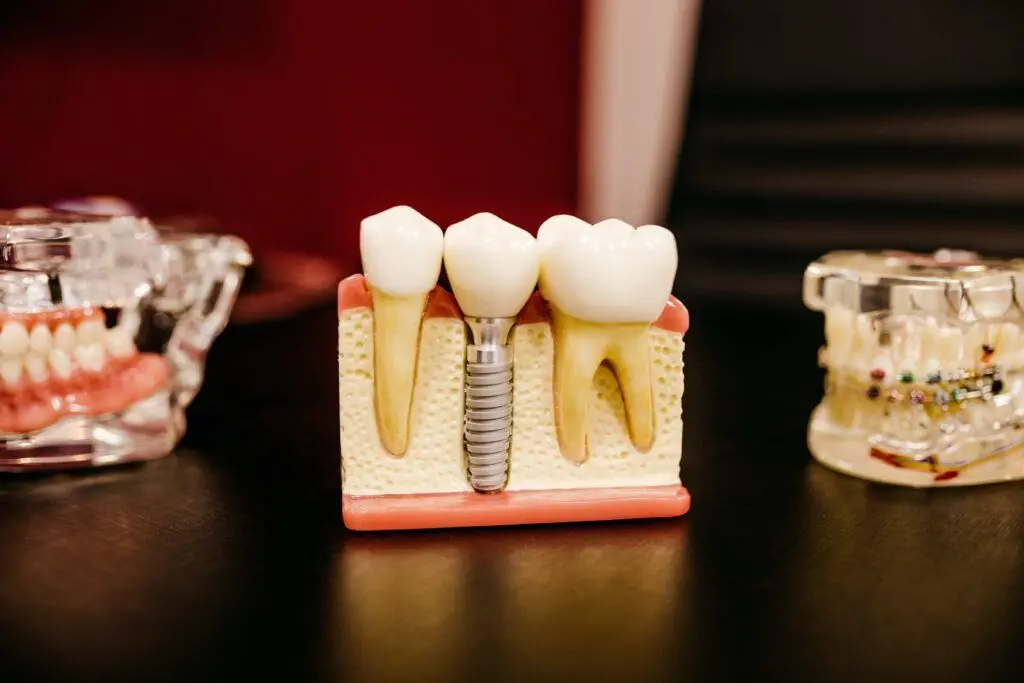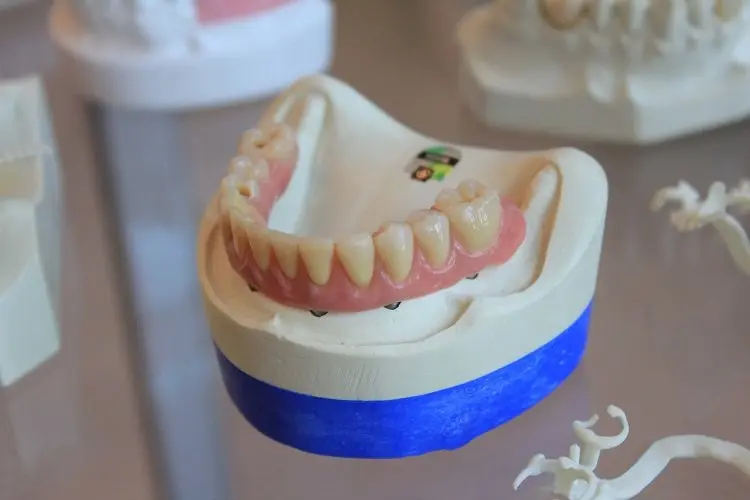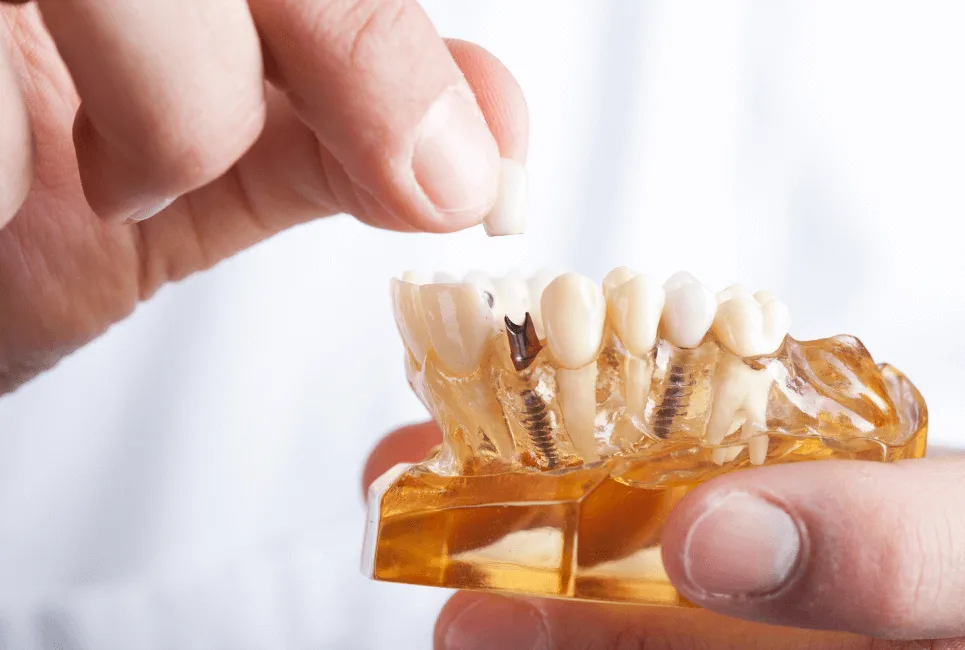- How to Find the Best Electric Toothbrush for Braces - August 7, 2021
- Best Mouth Guards for Braces: Top Brands to Consider - August 5, 2021
- Quip Toothbrush Review: What is Quip and Why Should You Choose it? - August 1, 2021
Anyone with missing teeth knows how uncomfortable or life changing it can be. Fortunately, modern dentistry offers dental implants as a solution to missing teeth and an improvement to many restorative treatments like dental bridges, partial dentures, and full dentures.
Dental implants are one of the most popular and certainly effective ways to restore your proper tooth function and esthetics.
What are Dental Implants?
A dental implant is the closest resemblance to replace a missing tooth. The number one reason for this is the implant screw replaces the root of the tooth while a custom crown replaces your natural tooth.
An implant screw is typically made from titanium because it is biocompatible and will integrate with your jawbone until it grows around it. This process is called osseointegration and helps create a more stable bone structure and support your new “tooth” for a lifetime.
Since your implant is fixed in place, it is permanent and will give you a natural feel of a real tooth. Unlike a denture that is removable and can slip, an implant is a solution that will help stabilize teeth and give you a new set of confidence. Implants can be treatment planned for a single missing tooth or several teeth.
Many people will opt for dental implants after years of struggling with faulty bridges or poorly fit dentures. Dental implant bridges and implant retained bridges are life changing dental treatments for those who have difficulty chewing and speaking.

A dental implant is not a single structure or piece. It is actually compromised of three parts that join together to give you an entirely new, custom tooth. The parts of an implant are:
- Implant screw: this piece screws into the jaw bone and osseointegrates after a few months to provide extra support and stability to the jawbone.
- Dental abutment: An abutment screws an implant into place and is a connector to the dental crown or prosthetic.
- Dental crown or prosthesis: This part is custom made to look like your adjacent natural teeth and is prothetic above your gum line. The crown is the esthetic part that will give you a natural tooth look and what you will use to bite and chew.
Who can Benefit from Dental Implants?
How can you tell if dental implants are right for you? The best thing to do is to schedule a consultation with your dentist to discuss your dental needs, concerns, and budget.
Essentially anyone with missing teeth could benefit from dental implants, but not everyone is always interested, is a good candidate, or has the finances.
Dental implants have several benefits that simply outweigh most other dental prosthetics. Some of these benefits of dental implants include:
Improved cosmetics
Implants are made from the highest quality materials like zirconia and porcelain and give you the most natural looking smile. This is because there is no metal, no black triangles, and no slippage of a dental prosthetic.
Dental implants are designed to mimic your natural teeth in size, shape, and shade. Most importantly, they are permanent and give you a lifetime of a new smile you can be confident in.
Improved jawbone support
When a tooth goes missing, it creates a domino effect for your adjacent teeth. Teeth begin to shift, creating alignment issues, and the opposing tooth may supra erupt into the missing tooth space because it has nothing to contact. Missing teeth also means bone recession and deterioration, which can cause a sunken-in jawbone and aged appearance.
Dental implants help resolve bone problems by supporting the jawbone and stimulates new bone cells as you eat and bite. Most people will need a bone graft to support an implant, which only helps strengthen the bone in the area of the missing tooth.
Improved dental prosthetics
Anyone with a partial or full denture knows how difficult it can be as they wear over time and become mobile. Unlike a denture, implants are a permanent solution and non-removable.
Dentures are not made to last a lifetime, and after so many years, they become worn down, become loose, create a decreased vertical dimension that affects your TMJ, and are difficult to wear.
An implant retained denture is a wonderful solution because it replaces an entire arch of teeth in a more esthetic and stable way. For those who have transitioned from a removable denture to an implant retained denture, the results are life changing and dramatic.
Improved eating
Studies show that long time denture wearers have more gastrointestinal issues because of difficulty chewing. This is because, over time, denture acrylic and teeth become worn down, which causes challenges to chew food and ultimately causes digestive problems.
Those with dental bridges experience food getting caught under bridges, which causes an increased risk for tooth decay, bad breath, and periodontal problems.
Implants simply resemble your natural teeth, and whether you are missing only one or an entire arch or teeth, an implant will make your mealtime more enjoyable and healthier.

Improved confidence
There is no question that implants will help improve your self-esteem and smile. While denture can become loose over time and not fit properly, implants remain in place while you eat, speak, and smile.
No one wants to wear an uncomfortable, bulky denture that can shift while you chew, but an implant is stable, comfortable, and will give you a new smile you be proud to show off.
Improved oral health
Missing teeth can result from many causes, but the most common cause is tooth decay. To replace a single missing tooth, many people will opt for a dental bridge because it is simple, economical, and quickly restores function.
However, with poor oral health, that bridge may fail if tooth decay progresses in other teeth, and this cycle between tooth decay and dental extractions becomes more frequent.
Fortunately, a dental implant is free from the risk of tooth decay. While you still need to maintain good oral hygiene habits, an implant helps restore function while avoiding the invasiveness of shaving down adjacent teeth for a bridge.
Implants also help preserve bone, so there is no gum recession and shifting of neighboring teeth. Studies show that dental implants are the most effective type of treatment to maintain and restore optimal oral health.
Who is a Good Candidate for Dental Implants?
Dental implants are a major investment – financially, emotionally, time-wise, therefore, it is important to determine if you are a proper candidate for implant treatment.
Even in the best scenarios, implants can fail, although studies show with the proper conditions, implants have a 95+% success rate. The factors that determine if you are an ideal candidate for dental implants include:
Good oral health
You should not have periodontal disease because bone and tissue loss are not positive factors for implant success.
Sufficient bone
You need an adequate amount of bone to support the implant for the greatest long-term results. If you don’t have sufficient bone quantity of density, it may be recommended to get a bone graft, which improves the support of the jawbone.
Some people are recommended to get mini implants or a sinus lift to prevent complications.
Good overall health
Chronic health conditions like heart disease, diabetes, and cancer can create an increased risk for dental implant failure.
Non-smoker
Tobacco use is one of the greatest reasons for implant failure and doesn’t promote proper healing or osseointegration of the implant to your jaw bone.

Who is a Poor Candidate for Dental Implants?
Pregnancy
It is recommended to defer elective and surgical treatment until post-pregnancy for the safety of the expectant mother and baby.
Teeth grinding
If you are a chronic teeth grinder at night, it does not disqualify you from getting implants, but it can put a lot of pressure and forces on your new implants. It may be recommended to get a nightguard to protect your new implant and adjacent teeth from wearing down.
Alcohol and tobacco use
Both are proven to have negative effects on the healing process. Smoking is one of the number one reasons for dental implant failure.
Age
For people congenitally missing teeth, it is recommended to be done growing before getting an implant. Children usually have to wait until they are 17-18 years-old if they are missing an adult tooth before implant placement.
Poor medical health
While many people have chronic medical conditions, it is highly recommended to have a stable medical history before getting dental implants.
It is always a good recommendation to speak to your primary care doctor and dentist about implants if you are immunocompromised or have a chronic inflammatory condition.
What are the Different Types of Dental Implants?
The two main types of dental implants offered include:
- Endosteal implants: These are the most common type of dental implant because they provide a strong foundation as they are placed under the gumline, directly into the jawbone.
- Subperiosteal implants: This type of implant is recommended for people who may not have sufficient bone and prefers no bone grafting. They are usually placed on or above the jawbone, but studies show they have a higher rate of failure than endosteal implants.
Who is Qualified to Treat Dental Implants?
Since dental implants are so popular and sought after, many dental specialists can place and restore implants. Dental implants are even taught as early as a dental school, so students are familiar with the treatment and, if interested can take further residency and continuing education courses to become more proficient in implant dentistry.
The types of dentists that treat dental implants include:
- General dentist: A general dentist will usually restore implants with crowns, bridges, and dentures, but with the proper training, some prefer to place their own implants too.
- Periodontist: A periodontist has extensive training in surgical extractions, bone grafting, and placing implants. While a periodontist will not restore the implant, they will often work in conjunction with a general dentist or prosthodontist for the tooth replacement.
- Oral surgeon: Surgeons are trained to extract teeth, place implants, and perform all necessary surgical procedures, including grafting, bone augmentation, and sinus lifts.
What is the Dental Implant Process?
Contrary to many beliefs, the implant process is not quick. While some market “over-night implants,” the truth is most reputable dentists will place and restore dental implants in a timespan ranging from six months to one year.
This is because, for the best implant success, they need to heal, osseointegrate to the bone, and ensure there is no failure before completing the tooth replacement.
The process of an implant usually requires the following steps:
Dental consultation
A visit with your dentist will determine if you are a good candidate for an implant. Your dentist will take a set of dental radiographs to evaluate the bone level, location of nearby structures like nerves, the sinus, etc. and ensure an implant can be placed safely.
Many dentists will take a 3D Cone Beam x-ray because it is the best way to determine the proper placement of an implant and is used as a guide during the surgical process.
Many times a general dentist can place an implant if she or he has the proper education and training. If the implant is too complicated, your general dentist may refer you to a specialist like a periodontist or oral surgeon for implant surgery.
Possible surgical procedure
Depending on your oral health condition, you may need a bone graft to help support your jawbone and improve bone density to stabilize the implant.
Some people also require sinus lifts for dental implants placed in the upper arch if the sinus is too low and more room is needed for the implant. Once the sinus wall is lifted, bone graft material is used to create a new wall that integrates into with the neighboring bone.
Anesthesia
Some people prefer to undergo general anesthesia for the surgical procedure if they have a fear of the dentist or anxiety with needles.
Local anesthesia
You will get numb to avoid any discomfort during the surgical placement of the implant.
Implant screw placement
An implant screw is drilled into the bone socket of the missing tooth using special instruments and drills. Sometimes additional bone grafting is placed around the implant screw to help fill the socket if there is insufficient bone or a bone defect.
Healing process
Recovery time can take a few months, depending on the procedure and the patient’s health condition. Typically, it will take three to six months for an implant to heal and properly fuse with the surrounding bone.
Abutment placement
An abutment is a connector from the implant screw to the new crown that will be custom made.
Dental prosthesis
Your general dentist will take impressions of your abutment to have a custom single crown, bridge, or denture fabricated.
What is Dental Implant Recovery?
An implant recovery is longer than other types of dental procedures like a dental crown, bridge, or denture because of the need for the implant screw to osseointegrate properly and fuse to the alveolar bone.
Without the implant fusing to the surrounding bone, there is no solid foundation for the replacement teeth, and the entire implant process can fail. Therefore, long-term recovery can last three to six months.
Immediately following the surgical implant procedure, you can expect to experience temporary numbness, bleeding, swelling, and bruising at the surgical site. You can take over-the-counter pain medications or any medication prescribed for you by your dentist.
It is recommended to eat a soft food diet for a few days and avoid anything hard or crunchy that can disturb the implant from healing. As always, it is always recommended to avoid any tobacco products.
What is the cost of Dental Implants?
Dental implants are definitely a major investment in your oral and overall health and general well-being. There is no close comparison to the effect of an implant on other prosthetics, and usually, the cost reflects this.
The cost will usually vary and depend on numerous factors such as the number of implants, the type of dentist, your tooth-replacement options, and any other factors like the need for bone grafting, imaging, and insurance.
Most of the time, dental insurances will not cover implants, and it is fully out-of-pocket. There are some medical instances that may cover a portion of the procedure based on the plan.
The cost of a dental implant can be broken down into three main categories:
- Implant placement: It will typically range from $2,000 to $25000 depending on how many implants you need. A full mouth of implants for both arches can range on the high side because of the time and level of care needed.
- Bone grafting: If you need a bone graft, it will range in cost $500 to $1500.
- Dental crown: A single dental crown will range in cost $1500 to $3000.
You can expect a single dental implant and crown to cost anywhere from $4000 – $6000. A full mouth of implant retained dentures can cost $25,000 to $50,000.
Frequently Asked Questions
Answer: Dental implants most commonly cause an infection called peri-implantitis. This means for several reasons – a medical condition, infected bone tissue, etc. may cause an infection and a failure for the implant. Other common problems are loose implants, gum recession, and a failure of the implant to fuse to the bone. Fortunately, most implants have a 95+% success.
Answer: New dental implants are taken care of the same way you care for your natural teeth. Brushing and flossing daily, maintaining a healthy diet, and attending routine dental visits are the best ways to maintain the longevity of your implant. Just like your natural teeth, it is important to have good home care to avoid periodontal disease to cause complications for your implant.
Answer: Dental implants are a safe and effective dental procedure to replacing missing teeth. As long as you are in good health and are going to a dentist with the proper education and training, there is no reason to consider implant dentistry unsafe. In fact, it is one of the most popular fields in dentistry today.
Answer: Implants are designed to last a lifetime. With the proper maintenance including oral care at home and going to your dentist twice a year, you can expect your implant to last many, many decades.


